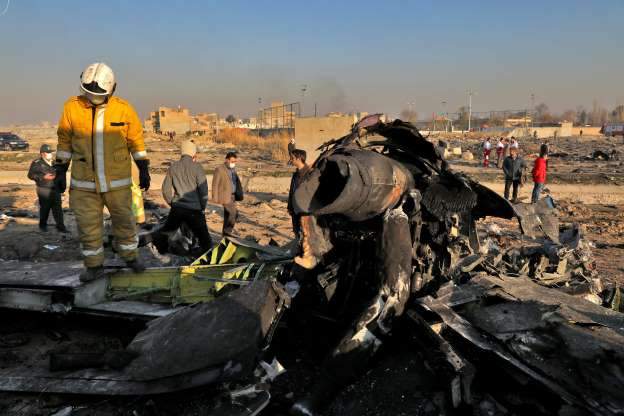Ukraine plane was probably shot down by Iranian missile, report claims

The Ukrainian jet that crashed after taking off from a Tehran airport probably was shot down by an Iranian missile, a London-based global information company says.
"Photographs purportedly taken near the site of the crash and circulated on social media appear to show the guidance section of an SA-15 Gauntlet short-range, surface to air missile, which landed in a nearby garden," the firm IHS Markit said in its report.
The firm said it could not confirm the authenticity of the photos but "assesses them to be credible."
Ukraine International Airlines Flight 752 crashed hours after Iran launched a ballistic missile attack on Iraqi bases housing U.S. soldiers. All 176 passengers and crew of the Boeing 737-800 were killed.
In Ukraine, Oleksiy Danilov, secretary of the National Security and Defense Council, said that investigators were investigating claims that parts of a Russian-made, surface-to-air missile stocked by Iran had been found near the crash site.
In a preliminary crash report issued Thursday, Iran's civil aviation authority said the plane's crew never made a radio call for help and were trying to turn back to the airport when the plane went down.
IHS Markit says publicly available air traffic data is "not consistent" with Iran's claim.
"A pilot of an airliner that took off from Tehran airport shortly after UIA Flight 752 told an IHS Markit source that he watched the aircraft take off and then explode in midair," the report says.
Iranian authorities have said the plane apparently suffered engine failure. Iran authorities say they have recovered the audio and data recorders from the flight, but say they won't allow Boeing or U.S. aviation officials access to the black boxes.
The Iranian explanation immediately drew skepticism from some aviation experts.
"There was no way for Iran to know it was engine failure,” said Mary Schiavo, a former U.S. Department of Transportation inspector general and a pilot.
"That is the wreckage of an explosion in the air,” she said. “Something happened to blow that plane out of the air. Statistically speaking, that’s a missile or a bomb."
Photo:© Ebrahim Noroozi, AP
Rescue workers search the scene where a Ukrainian plane crashed in Shahedshahr, southwest of the capital Tehran, Iran, Jan. 8, 2020. A Ukrainian airplane with more than 170 people crashed on Wednesday shortly after takeoff from Tehran's main airport, killing all onboard.




